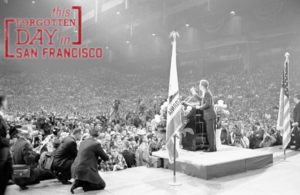RPCV Ambassadors: Not Pale, Male, and Yale
 One of JFK’s most famous speeches was given in the old Cow Palace Auditorium in San Francisco, on November 2, 1960, six days before the presidential election. It was Kennedy’s last major address before the election.
One of JFK’s most famous speeches was given in the old Cow Palace Auditorium in San Francisco, on November 2, 1960, six days before the presidential election. It was Kennedy’s last major address before the election.
It was a speech of six single-spaced pages, less than 3000 words. Written by Ted Sorenson and JFK it was entitled, “Staffing A Foreign Policy For Peace.” In it Kennedy proposed a new government agency, “The Peace Corps” using that name for the very first time. And with the “Peace Corps” Kennedy envisioned a way to change America’s diplomatic service.
Kennedy began by demonstrating how ill-equipped our foreign service was, pointing out that the Lenin Institute for Political Warfare exported, each year, hundreds of agents to disrupt free institutions in the uncommitted world. Kennedy said, “A friend of mine visiting the Soviet Union last year met a young Russian couple studying Swahili and African customs at the Moscow Institute of Languages. They were not language teachers–he was a sanitation engineer and she was a nurse. And they were being prepared to live among African nations as missionaries for communism.”
Kennedy went on to say, “I have often been impressed with the caliber of men and women in the Foreign Service. But I have also been depressed by the selecting the non-career ambassadors who are placed in charge of these career servants. Many have been ill-chosen, ill-equipped, and ill-briefed.”
Next, JFK did a chapter-and-verse. “In 1958, it was reported that our Ambassador to Moscow was the only U.S. Ambassador to a Communist country who spoke the language of the country to which he was assigned. Only two of the nine ambassadors to Arabic-speaking countries spoke Arabic. In eight of the twelve non-English-speaking NATO countries, our ambassadors lacked a workable knowledge of the main language spoken there.”
Again, he returned to recent news, pointing out that in the newspapers it was reported, “a group of Russian geologists, electrical engineers, architects, and farming and fishing experts arrived in Ghana today to give technical advice.”
Summing up, Kennedy announced. “I therefore propose that our inadequate efforts in this area be supplemented by a Peace Corps of talented young men willing and able to serve their country in this fashion for three years as an alternative to peacetime selective service–well qualified through rigorous standards; well trained in the language, skills, and customs they will need to know; and directed and paid by the ICA Point Four agencies. We cannot discontinue training our men as soldiers of war–but we also need them as ‘ambassadors of peace.”
And these ‘ambassadors of people’ Kennedy envisioned would return from their Peace Corps service to become U.S. Ambassadors in the United States Foreign Service.
•
And indeed they did.
The State Department, which was famously labeled, “Pale, Male, and Yale” would increasingly be filled with PCVs, men and women, as Kennedy said, “from every race and walk of life.” (Part 1)

John, Can’t wait for Part 2 (and beyond). . . . –Tino
John, Thank you for this important history — and nicely done. Vicki
John, Very timely as the existing administration has been struggling to fill important posts which in some cases are still vacant–I think that South Korea doesn’t have a US ambassador despite the delicate negotiations going on. Evidently the administration did finally nominate Admiral Harry B. Harris Jr., the head of the US military’s Pacific Command, to the post of ambassador to South Korea–which could further complicate our relations there… I think that Kennedy was on to something when he promoted the idea of nominating candidates who know the local language and culture. I’ll look forward to learning who some of those RPCV Ambassadors were/are.
So meaningful to read the original words.